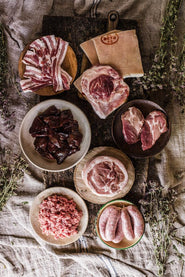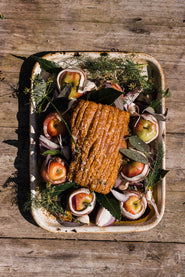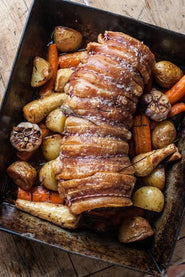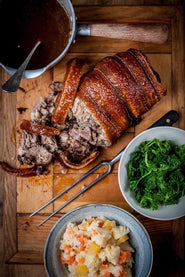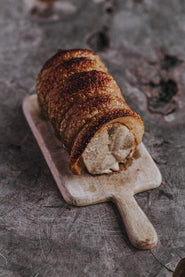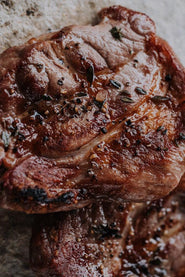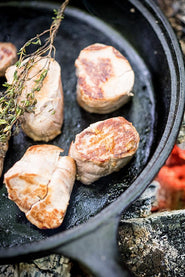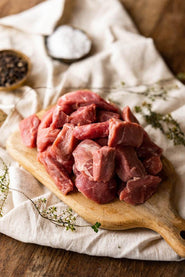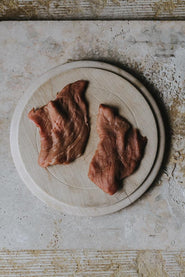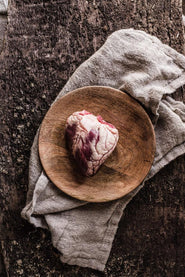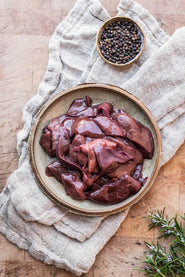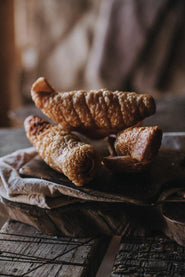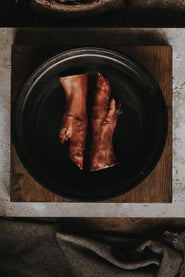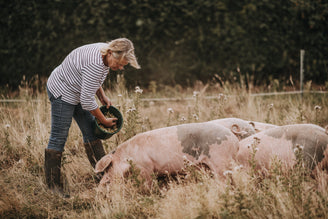Pipers Farm pigs are reared according to three principles that are part of our sustainable farming DNA – they are also why we’ve won so many awards for our exceptional pork. We’ll go a little deeper into each of these principles here.
Right animal, right place
Respect from birth to slaughter
Food that’s thought through
Right Animal, Right Place
As with all our livestock, we rear native breed pigs as we believe that the work’s already been done in creating an animal who thrives in the British climate and produces fantastic meat, with as little intervention from us as possible. The breeds we work with are; Wessex Saddleback crossed with a Welsh boar, pure Tamworth crossed with a Hampshire boar and Welsh Blacks. These breeds suit the outdoor “extensive” farming system that we use, flourishing in the mud, rain and sun all year round.

Native breeds produce an animal that makes equally outstanding pork as it does bacon, and thanks to their strong maternal instincts, our sows rear healthy litters of between 8 and 11 piglets (in comparison with intensive pig litters that are usually over 20 piglets per mother!).

This is in contrast to the highly bred animals used in intensive indoor pig farms who are bred to grow as quickly as possible at any cost, and would need constant high energy food and heated housing to survive outdoors.
Our pigs are raised on our own farm, and by three brilliant partner farmers.
Respect from Birth to Slaughter
Our pigs live outdoors with their trotters in the mud and grass year-round. They move through different parts of the farm as they pass through their life stages but always in groups, as they are social animals and therefore happiest together. We never dock tails – another common practice in intensive systems – our pigs are so content there is no negative biting behaviour that makes this necessary.
Our pigs start out life in their maternal family groups in large, outdoor paddocks. Each pen has an ark (pig house) and a wallowing area, so they have the freedom to dip in and cool off when the weather heats up. In the ark is a deep bed of straw that is used by our sows to build a cosy nest when they are ready to farrow. At around two months old, once naturally weaned the pigs, known as 'weaners' move into paddocks and are rotated across the farm to prevent the build-up of disease in overburdened land, and so the animals enjoy a diverse environment to explore, feed and socialise in.

Pigs are the brightest animals on our farm. They have individual personalities and express a wide variety of natural behaviours, such as rooting through forage crops, wallowing in mud and building nests when they are due to give birth, all of which makes the depravity of intensive farming systems all the more difficult to tolerate. Sow nest-building is especially beautiful to watch; while we fill each pig ark with a bed of straw, the sows will still often seek out their own bedding materials such as dried grass, to satisfy their instinct to prepare for the arrival of their piglets.
The respect with which we treat our pigs runs all the way through to slaughter. We work directly with small scale, low throughput abattoirs. This is vitally important to us. After slaughter we hang our pork for three weeks and are perhaps one of the last places in the UK to do so. We do this as it produces an exceptional flavour and superior quality of meat that does not shrink disproportionally when cooked.
Food That’s Thought Through
At Pipers Farm all of our pigs are reared on as natural a diet as is practical to achieve. They spend eight weeks on their mother’s milk, benefiting from the natural immunity it provides for far longer than is standard practice. Once weaned they are rotated across our farms, through pastures and leys where they graze and root through the grasses and herbs, around wooded areas where they seek out acorns and hazelnuts, through cider orchards where they feast on windfall apples, then on to fodder crops in the winter such as beet, kale and turnips. Here they root up and eat the crops straight from the earth, and it never ceases to amaze us how efficient they are at clearing a field – there is no food wasted here!

But where are all the grass-fed pigs? The answer is, you won’t find any. This is because the digestive system of a pig dictates that they cannot live on grass alone. Cattle and sheep have a four-chambered digestive system (the rumen, the reticulum, the omasum and the abomasum) which is designed to extract far more nutrients from a grass-based diet than a pig can. By working in tandem with millions of gut biota and the process of rumination when they regurgitate and chew their food for a second time to aid digestion, ruminant animals can live on grass alone. In contrast, pigs have just one stomach which relies primarily on stomach acids to break down food. In intensive systems this results in pigs being fed easily digested “concentrates” which are energy- and protein-dense pellets made from cereals (wheat/barley/maize), soya, and leftovers from food processing industries such as rapeseed and sunflower seed meal, along with liquid by-products such as whey. These are formulated together with other additives to maximise growth rates.

We feed our pigs a straightforward cereal mix, to meet their nutritional needs, particularly at the most important growth stages which are up to the age of 12 weeks, or when our sows are close to farrowing, and during lactation. This is mixed by a local animal feed business that we know and trust, and have been working with for 30 years. Alongside cereals our pigs eat: kale, turnips, fodder beet, pumpkins, apples, nuts and pasture.
Through these three principles we believe our pork is some of the best you can buy anywhere in the world, and we’ve a shelf-load of awards to back that up. Native breeds, eating a forage-heavy diet, reared on family farms, living a life where they have the freedom to express their natural behaviours and are respected from birth to slaughter to the table. Explore our collection of Native Breed pork, bacon and sausages for yourself - we believe you can taste the difference!

